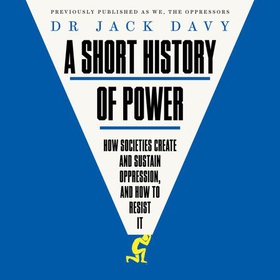
Legg til i ønskeliste
A Short History of Power lydbok
236,-
'I thought I had a pretty good sense of how colonialism shapes modern society, but Dr Davy has shown me that understanding these things is a lifetime's work. In the absence of time to read everything, you could not ask for a more eloquent guide than this book. Essential' - Sathnam SangheraAn eye-opening book about how societies are designed to support the status of those in power at the destructive expense of those without it. Read it and take responsibility.Ecological oppressionFrom 1958, Chin…
Lydbok
236,-
Forlag
Quercus
Utgitt
19 februar 2025
Lengde
7:26
Sjanger
Dokumentar og fakta, Historie
Språk
English
Format
mp3
DRM-beskyttelse
App-only
ISBN
9781529413960
'I thought I had a pretty good sense of how colonialism shapes modern society, but Dr Davy has shown me that understanding these things is a lifetime's work. In the absence of time to read everything, you could not ask for a more eloquent guide than this book. Essential' - Sathnam Sanghera
An eye-opening book about how societies are designed to support the status of those in power at the destructive expense of those without it. Read it and take responsibility.
Ecological oppression
From 1958, China declared war on sparrows, destroying their crops, contributing to the deaths of more than 10 million people.
Economic oppression
In the 19th century, the Shuar people of Ecuador were driven by economic need to wage bloody wars to procure shrunken heads for the Western curio market, which nearly destroyed their society.
Educational oppression
There have been 55 prime ministers of Great Britain, of whom 48 have been privately educated, creating a society built for and by the privileged.
These are just some of these stories in this remarkable book, that illustrate the key components through which society creates and sustains oppressive systems. Some are historical. Others have played out right before our eyes over the last decade. All are rooted in systems in which we all take part.
Together they expose the layers of systematic, often insidious oppression which make up the world today, and reflect the choices of people just like us to participate in them.
(P)2022 Quercus Editions Limited
An eye-opening book about how societies are designed to support the status of those in power at the destructive expense of those without it. Read it and take responsibility.
Ecological oppression
From 1958, China declared war on sparrows, destroying their crops, contributing to the deaths of more than 10 million people.
Economic oppression
In the 19th century, the Shuar people of Ecuador were driven by economic need to wage bloody wars to procure shrunken heads for the Western curio market, which nearly destroyed their society.
Educational oppression
There have been 55 prime ministers of Great Britain, of whom 48 have been privately educated, creating a society built for and by the privileged.
These are just some of these stories in this remarkable book, that illustrate the key components through which society creates and sustains oppressive systems. Some are historical. Others have played out right before our eyes over the last decade. All are rooted in systems in which we all take part.
Together they expose the layers of systematic, often insidious oppression which make up the world today, and reflect the choices of people just like us to participate in them.
(P)2022 Quercus Editions Limited






